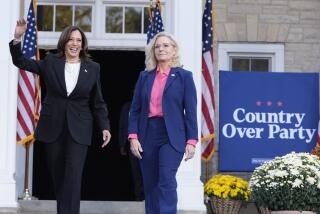Cheney Campaign Assails Kerry on Iraq
- Share via
CORNWALL, Pa. — In a move intended to directly undercut Sen. John F. Kerry on the day the Democratic presidential candidate launched a new attack on the Bush administration’s foreign policy, President Bush’s campaign today accused Kerry of favoring retreat from Iraq.
Offering a particularly pointed criticism of Kerry, in what the campaign said would be a multi-pronged attack, Vice President Dick Cheney also warned against caving in to terrorists’ tactics.
Citing the withdrawals of military forces that followed the bombing of a Marine Corps barracks in Beirut in 1983 and the attacks on U.S. troops in Mogadishu, Somalia a decade later, Cheney said that failing to respond to attacks on civilians would allow terrorists to become convinced that if they “keep up the pressure long enough, we’ll fold, take our toys and go home.”
“That’s an absolutely unacceptable outcome,” Cheney said.
The vice president’s remarks, largely in a statement that preceded a question-and-answer session in this central Pennsylvania hamlet, were among his most sharply worded attacks on Kerry in recent weeks. They fell into the general context of the Bush campaign’s effort to portray the Democrat as constantly shifting his positions, particularly on Iraq.
“Depending on what day of the week it is when you catch John Kerry,” Cheney said, “he’s supportive of what we’re trying to do, or he wants to change it, or he wants to retreat. It’s difficult to tell.”
The Bush campaign has spent months criticizing Kerry on the basis of his vote in favor of using force in Iraq, then his vote against a Bush request for $87 billion for additional funding to carry out the war beyond its initial costs and, most recently, his declaration that in Iraq, Bush was conducting “the wrong war” at the wrong place and at the wrong time.
All told, Cheney said, with Kerry’s foreign policy speech in New York today, the Democrat has taken nine positions on Iraq.
Cheney contrasted Kerry’s pronouncements with “the very firm commitment the president of the United States put in place.”
Emphasizing the requirement that the United States’ troops, allies and enemies understand the policy enunciated in Washington, the vice president said: “If you don’t have a clear, steady signal from the president of the United States, what you get out there on the other end of it is confusion, weakness, uncertainty and indecision.”
What emerges from the way Kerry “has attempted to deal with this issue, or not deal with it,” Cheney said, is the impression “that we will not have, in the Kerry administration, a firm hand on the tiller.”
Cheney also posed a rhetorical question, raising doubts about how Kerry would have responded had he been president on Sept. 11, 2001.
“If he had been in the Oval Office on 9/11, what kind of policy would the United States have carried out?” he said.
Cheney did not answer his own question.
The vice president’s remarks were part of a concerted effort by the Bush campaign today to present Kerry as ready to declare defeat in Iraq, basing the attack on a series of comments, the most recent by retired Adm. William Crowe, the retired chairman of the Joint Chiefs of Staff who has supported Kerry.
Crowe, in remarks Thursday to a University of Oklahoma group, was quoted by the Associated Press as saying, “Our leaders must explain why we’re going to stay, and what type of progress must be made” in Iraq.
“That is the No. 1 lesson of Vietnam. We must decide if we’re paying a larger price at home than justifies the gains made in Iraq,” he said, in remarks that the Bush campaign distributed this morning.
And Kerry, in an interview with National Public Radio in August, said, “I believe that within a year from now, we could significantly reduce American forces in Iraq, and that’s my plan.” The Bush campaign distributed the comment under the heading, “Kerry on ‘Retreat and Defeat.’”
Cheney spoke in a tent set up in a parking lot of PRL Industries, a firm that makes iron machinery for defense contractors, among others. It is situated in the heart of a very Republican region of Pennsylvania — Lebanon County, which is known for never having given a majority of its votes to a Democratic presidential nominee.
It reflected the campaign’s effort to use Cheney to stir up the most committed Republican voters to make sure they get to the polls Nov. 2 in the most hotly contested states.
The vice president largely avoided economic matters; none of the questions posed to him by the friendly audience challenged him on the administration’s economic record or policies.
But Democrats distributed an accounting of the economic picture in Pennsylvania: The loss of 1,200 manufacturing jobs in August, bringing the total of manufacturing jobs that have disappeared in the state since Bush took office to 161,200.
More to Read
Sign up for Essential California
The most important California stories and recommendations in your inbox every morning.
You may occasionally receive promotional content from the Los Angeles Times.













